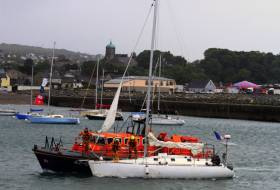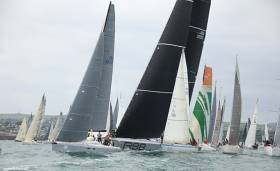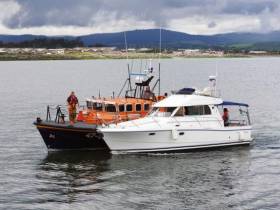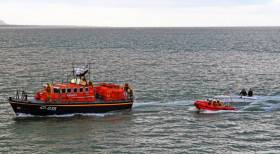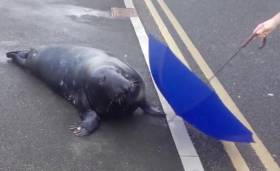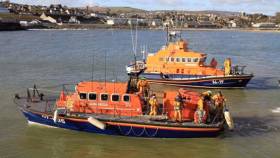Displaying items by tag: Wicklow
Wicklow Lifeboat Assists Solo Sailor After Distress Call
#RNLI - Wicklow RNLI's all-weather lifeboat launched yesterday afternoon (Sunday 19 June) to a solo sailor in distress six miles off the Wicklow coast.
A marine VHF radio distress signal was received by the Irish Coast Guard from the French sailor on passage from France to Norway, when the twin rudder of his yacht suffered damaged and he was unable to steer the vessel.
The lifeboat was alongside the casualty 30 minutes after launch. Rescue 116, the Dublin-based coastguard helicopter was also tasked to the incident, remaining overhead while lifeboat volunteer Ciaran Doyle was transferred onto the yacht to assist the sailor with hauling an anchor and preparing a towline.
Weather conditions at the time had a rough sea state with a southerly Force 5-6 wind and good visibility.
With a towline established, the 10m yacht was taken back to Wicklow Harbour. Due to the conditions at the time, the journey took over 90 minutes as the line parted on three occasions.
The yacht was safely alongside the south quay at 5pm on Sunday evening.
Speaking after the callout, Wicklow RNLI lifeboat press officer Tommy Dover said: "Our coxswain Nick Keogh displayed great boat handling skills this afternoon in challenging conditions, while safely transferring a crewmember onto the yacht to assist the lone sailor."
This was the second callout over the weekend. On Saturday morning (18 June), during the Round Ireland Yacht Race, Wicklow RNLI helm Vinnie Mulvihill was busy preparing the inshore lifeboat for exercise when he heard shouts that someone was in the water near the East Pier.
Quick-thinking Mulvihill left the boat and entered the water to assist the woman after she slipped and fell in while going ashore from a moored boat.
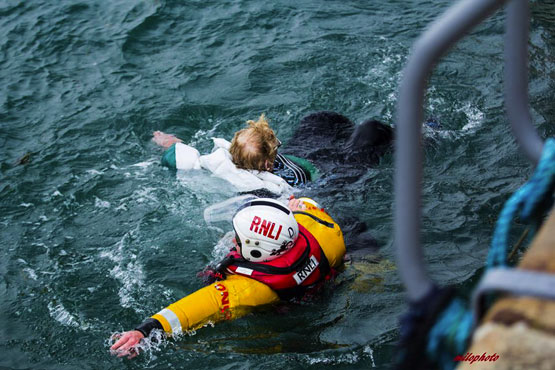
Woman rescued by Wicklow RNLI after she slipped into the harbour (Photo: RNLI/Milo Vanbeck)
He brought the women alongside a nearby boat and with the help of the occupants, she was taken out of the water and assessed at the lifeboat station by first aider Carol Flahive.
No further medical assistance was required and the woman left the station none the worse from her ordeal after a cup of tea and changing into dry clothes.
#RoundIreland - The 19th Round Ireland Yacht Race got off to a dramatic start from Wicklow at 1pm today. Although American maxi Rambler was prevented from making her spectacular committee boat start by smaller competitors blocking her lane, it was not long before one of the fastest monohulls in the world was streaking ahead of the fleet at Wicklow Head. See start sequence photos of Rambler 88 here.
The committee vessel was lying to the strong south going tide and as the record fleet lined up it was clear the 3–knot tide was bringing them to the line early, too early in some cases.
The large monohull fleet of 52 boats started on time at 1pm but there was a delay starting the multihulls ten minutes later because of an individual recall for boats in the main fleet who had started prematurely. Boats were recalled over the VHF radio by the race committee and were required to start again. Double race winner Cavatina from Royal Cork YC, ironically one of the slowest in the fleet, was one of three boats obliged to restart.
There was some congested waters at the committee boat end of the starting line too as boats clearing the line on starboard tack (including the maxi Rambler) and heading out to sea were confronted by spectator craft in their path.
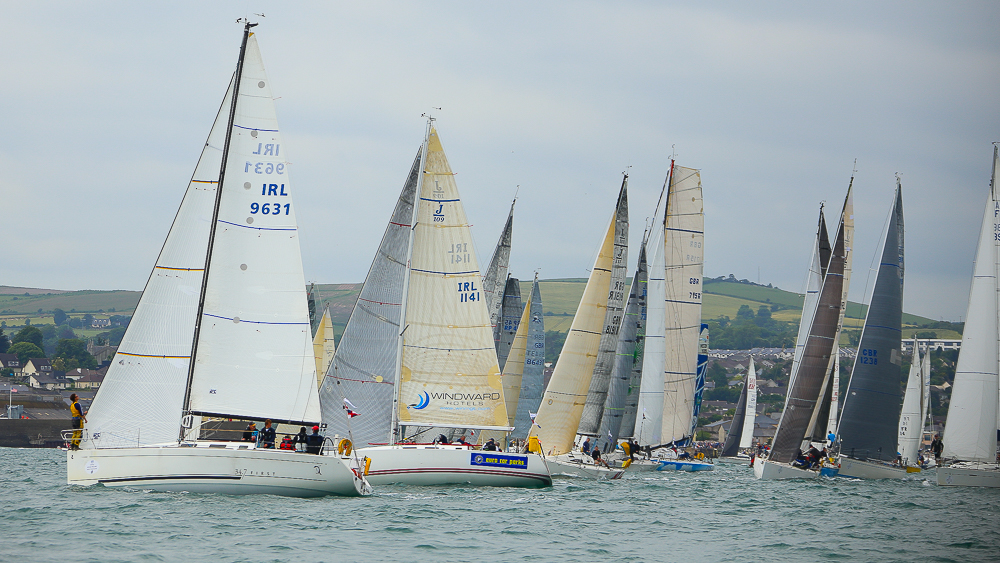
Adelie (IRL9631) and Euro Car Parks (IRLII41) port tack the fleet at the start of the Round Ireland race 2016
As expected, the three MOD70s multihulls started ten minutes later and streaked ahead soon after the biggest boats in the record–breaking 63–boat fleet passed Wicklow Head.
Shooting @RoundIreland race for @IrishTimes from chopper today #Nikon #Ireland #photography #sailing #roundireland pic.twitter.com/2LU8ygU3Oy
— Eric Luke (@EricLuke2) June 18, 2016
Conditions were as forecast with a light southerly wind of eight to ten knots and south going tide making for one of the first upwind starts in many years.
Fleet bragging rights for the first boat to Wicklow Head was of course Rambler, second was RORC entry Katsu. It was an impressive start under the gaze of hundred of shoreside spectators and a flotilla of boats on the water but as everyone knows, this is not a sprint but a full ocean marathon race of 700–miles duration.
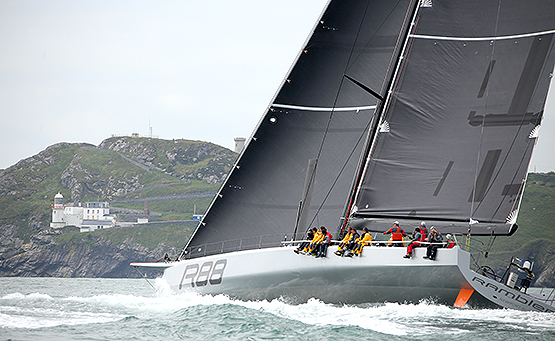
Rambler 88 powers by Wicklow Head
The Navy vessel LE Aisling, as the official starting vessel, sent the fleet on its way. The fastest boats could be back by Monday and a number of Round Ireland records yet could be broken but the overall winner on handicap may not be know till much later in the week, possibly as late as next Friday.
A number of boats hit hit the line at precisely the right moment, aided by a strong tide, prompting some on the shoreline to query just how many boats were over.
As forecast by Afloat.ie's Mike Broughton, a ridge of high pressure over Wicklow brought a light sea breeze off Wicklow Head, and there were near perfect sailing conditions off the Wicklow coast of 8-10-knot winds from the south bright sunshine and a relatively flat sea state.
And they're off! @RoundIreland pic.twitter.com/86PLt11zdf
— Aengus Cox (@AengusCox) June 18, 2016
The 64-boat fleet cleared Wicklow Bay and Wicklow Head Lighthouse under a two-knot ebb tide, pushing them down along the Wexford coastline.
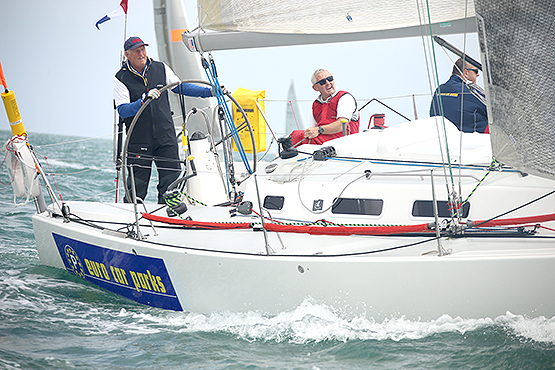
J109 Euro Car Parks steered by Olympian Mark Mansfield, one of 63 boats in today's Round Ireland fleet
However, as forecast, the fleet are expected to have stronger winds tonight as they approach Tuskar Rock. South westerly winds increasing 12-17 knots by early evening, giving a beat south towards Tuskar Rock. Then we have unsettled conditions from midnight as the first of possibly seven fronts to pass the fleet over the next four days. The first warm front will bring light rain and SW winds of 9-15 knots – still giving a beat along the south coast.
The 700-mile race is anticipated to take up to five days to complete, with the biggest boats expected home sometime on Monday.
Follow our race updates all in one handy link here
Read WM Nixon's Round Ireland Race 2016 Preview
Wicklow Lifeboat Assists Five On Motor Cruiser
#RNLI - Wicklow RNLI's all-weather lifeboat launched to give assistance to an English motor cruiser at 12.20pm yesterday (Sunday 12 June).
The cruiser, with five people on board, was on passage from Dun Laoghaire to Pembroke when it developed mechanical problems four miles south of Wicklow Harbour.
Just 15 minutes later, the lifeboat, under the command of coxswain Nick Keogh, was alongside the drifting cruiser. A towline was established and the volunteer crew brought the cruiser back to Wicklow.
This was the second callout out of the week for the Wicklow RNLI crew. On Wednesday morning, the all-weather lifeboat launched to assist a French yacht with three people on board that had its propeller fouled by a rope.
The crew of the yacht managed to free the rope obstruction and the lifeboat stood by until the yacht was able to resume its passage south.
Next Friday 17 June, Wicklow RNLI will hold a lifejacket clinic at the lifeboat station from 11am to 4pm in conjunction with the Round Ireland Sailfest.
Anyone who owns a lifejacket is encouraged to bring it along for a free check. Advice will also be available with tips on how to choose, fit and maintain your lifejacket.
Wicklow Lifeboats Assist Two On Motor Cruiser
#RNLI - Both Wicklow RNLI lifeboats launched after 7.20pm on Sunday evening (22 May) to assist two men in a small motor cruiser near Wicklow Head.
A member of the public contacted the Irish Coast Guard after seeing the men bailing water out of the vessel.
The motor cruiser was located about a half-mile northeast of Wicklow Head a short time later.
Weather conditions on scene were described as having a moderate sea state with north-easterly Force 3 winds and good visibility.
The boat was taken in tow by the all-weather lifeboat back to Wicklow Harbour, where the two occupants were taken ashore safe and well by the inshore lifeboat crew.
Sammy The Seal Has Fishmongers Flustered
#MarineWildlife - A hungry seal with a taste for only the finest seafood has been filmed up to his old tricks again in Wicklow town.
Earlier this month UPI reported on the antics of Sammy the seal, who's grown notorious for his habit of flopping across the road from the River Vartry to beg for scraps from a local fishmonger.
In his latest appearance, Broadsheet.ie reader Kevin O'Farrell videoed the flustered staff of The Fishman trying to halt Sammy from crossing what can be a busy road before throwing him his meal – one of three every day at high tide.
And as the onlooker adds, it's only been getting worse since a new lady seal came into Sammy's life, promoting the juvenile grey seal to show off his remarkable skills of persuasion.
Here's more on Sammy and his fishmonger friends in Wicklow from RTÉ News Now:
#RNLI - Three RNLI lifeboats from Wicklow and Arklow launched after 5am on Tuesday morning (23 February) to assist a grounded fishing vessel with seven people onboard.
The volunteer lifeboat crews quickly located the 20m fishing boat, which had run aground on the Wolf Rock near the beach at Brittas Bay.
Weather conditions in the area at the time were described as blowing north-easterly with Force 4-5 winds and rough seas.
Arriving on scene, the lifeboat crews observed that no one was in immediate danger. No leaks or damage were found during an inspection of the hull.
Towlines were quickly established between the casualty vessel using Wicklow RNLI’s inshore lifeboat. The vessel was re-floated by the all-weather lifeboats from both stations and the vessel was towed clear of the rock and onward to Wicklow Harbour, where she was safely secured alongside the East Pier shortly before 11am.
Speaking following the callout, Wicklow RNLI volunteer lifeboat press officer Tommy Dover said: "Our lifeboat and shore crews had an early call this morning but we were delighted to help and bring this vessel safely to shore.
"The callout was a real team effort this morning where ours crews from both Wicklow and Arklow were able to put their skills and joint training to good use in assisting the fishermen to Wicklow Harbour."
Wicklow, Arranmore Lifeboats Respond In Separate Tow-In Callouts
#RNLI - Wicklow RNLI's all-weather lifeboat launched at 5.31pm yesterday evening (Sunday 22 November) to assist a yacht with two people on board at Wicklow Harbour.
The skipper of the 10-metre yacht contacted the coastguard for assistance after briefly running aground near the Packet pier.
Within minutes the lifeboat and its volunteer crew – coxswain Nick Keogh, mechanic Tommy Murphy, Dave O'Leary, Lisa O'Leary, Connie O'Gara and Joe Hanlon – were alongside the vessel.
Two volunteers went on board the yacht to establish a towline and assist as the lifeboat towed the vessel to the north quay.
Elsewhere at the weekend, Arranmore RNLI in Co Donegal was called to assist a 27-foot fishing boat with two on board just after 5pm on Saturday evening (21 November).
The boat from the fishing village of Burtonport was less than half a mile from the lifeboat station when it got into difficulty with a fouled propeller.
Arranmore RNLI second coxswain Jimmy Early and his volunteer crew secured a tow rope on board the fishing boat and towed it into Burtonport Harbour at 6.15pm.
On returning to the station, Early said the crew was pleased to be of assistance.
"It was very fortunate that the boat was fishing close to the station when it got into difficulty and we were able to establish a tow rope within minutes of launching, it was certainly one of the fastest rescues we had," he said.
Wicklow Lifeboats Assists Four On Fishing Boat
#RNLI - Wicklow RNLI's all-weather lifeboat slipped her moorings shortly before midday yesterday (Tuesday 22 September) to assist a fishing vessel with mechanical problems about nine miles offshore.
The fishing vessel with four crew lost propulsion and was unable to make any headway due to problems with the propeller. The skipper contacted the Irish Coast Guard by marine VHF radio for assistance.
Under the command of coxswain Nick Keogh, the lifeboat was alongside the drifting vessel at 12.30pm. Conditions on scene were described as having a northerly Force 4 wind with a moderate sea state.
A towline was quickly established and the trawler was towed back to Wicklow Port. The lifeboat crew secured the fishing vessel safely alongside the South Quay before 2pm.
The crew on the callout were Keogh, mechanic Brendan Copeland, Tommy McAulay, Tommy Murphy, Carol Flahive, John Vize and Dean Mulvihill.
Wicklow Lifeboat Launches To Fishing Vessel Breakdown
#RNLI - Wicklow's all-weather lifeboat slipped her moorings at 11.42am yesterday morning (Sunday 13 September) to assist a broken-down fishing boat off Wicklow Harbour.
The fishing vessel, on passage north out of Arklow, sustained gearbox failure about one mile off Wicklow Port.
Wicklow's RNLI crew were alongside the drifting vessel three minutes after launch, and a towline was quickly established.
Conditions in the bay at the time recorded a sea state slight, overcast with squally showers and a southwesterly Force 4 wind.
The fishing vessel, with two crew, was towed into Wicklow Harbour and safely secured alongside the south quay shortly after noon.
This was the second callout in 24 hours for the volunteer crew, which on this mission comprised second coxswain Ciaran Doyle, second mechanic Lisa O'Leary, Terry Sillery, Kevin Rahill, Carol Flahive, Dean Mulvihill and Peter McCann.
Personal Beacons For Kayakers Recommended In Report On Inchavore Drowning Tragedy
#MCIB - The official report into the death of a kayaker on a Wicklow river last year recommends that anyone kayaking a river of Grade 3 or above should carry a personal locator beacon.
As previously reported on Afloat.ie, Shane Murprhy (21) from Baldoyle in North Dublin drowned while kayaking on the River Inchavore on 13 November 2014.
The inquest into his death this summer heard that Murphy became separated from his group while paddling the river swollen by heavy rains.
Despite righting himself a number of times, he was quickly thrown from his kayak and seen face down in the water before the river took him away from his fellow kayakers.
He was later found trapped in branches amid fast flowing water two sets of rapids down from where he was last seen.
The report into the incident by the Marine Casualty Investigation Board (MCIB) found that the river was rated between Grades 4 and 5 – advanced to expert – and within the capabilities of the group, some of whom had paddled it before without incident, and was only passable in flood conditions such as on that day.
However, it found that the noise of the river made communication between the group very difficult when out of line of sight, which hampered their search for Murphy when he became separated from the rest.
The MCIB recommends that "kayaking groups making descents on remove rivers of Grade 3 or higher carry registered personal locator beacons" or PLBs which would enable early alerting of rescue crews in the event of an emergency.
It also recommends that Canoeing Ireland advise kayakers in such situations to consider using waterproof radios to allow communication between group members.
Additionally it was found that the delay in contacting emergency services, due to lack of mobile phone signal in that remote part of Co Wicklow, "did not impact on the casualty’s survival" in this case.
The MCIB's complete report on the incident is available as a PDF to read or download HERE.


























